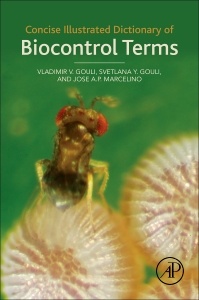Description
Concise Illustrated Dictionary of Biocontrol Terms
Authors: Gouli Vladimir V., Gouli Svetlana Y., Marcelino Jose A.P.
Language: English
Subject for Concise Illustrated Dictionary of Biocontrol Terms:
194 p. · 15x22.8 cm · Paperback
Out of Print
Description
/li>Contents
/li>Biography
/li>Comment
/li>
The Concise Illustrated Dictionary of Biocontrol Terms includes basic terminology related to the biological control of pests, together with state-of-the-art scientific and practical terms, for expedient comprehension and analysis of present, forecasted or in situ pest management problems. In addition, it also provides the names of the most common pesticides and predators commercially available in different continents (Americas, Europe, Asia, Australia, Africa), as well as target pests and diseases of these agents, making it a tangible tool for prompt management actions. The dictionary is copiously illustrated with original pictures clarifying the most commonly used terms and the identity of organisms in biocontrol technology, with content that is both scientifically rigorous and clear.
The biological control of pests using living organisms, or products from their activities, is an independent branch of science based on multiple disciplines including general biology, zoology, entomology, phytopathology, microbiology and others. As a result, the field of biological control has its own specific terminology that needs to be understood and applied correctly across this variety of disciplines, including among those approaching the field from a different area of expertise and who may have difficulty understanding the terms used by experts in the field.
This compact illustrated guide will appeal to the scientific community working in integrated pest management disciplines, as well as those researching, studying, and working with interest in protecting natural resources at a global, local, and individual level, in a variety of locations including the lab, garden, field, or forest.
The biological control of pests and pathogens utilizing living organisms is an independent branch of science based on multiple disciplines including biology, zoology, entomology, phytopathology and microbiology. As a result, the field of biological control has its own specific terminology. Understanding the terms of a given science mitigates concerns, facilitates comprehension and clarifies context. The concise dictionary of biocontrol terms includes basic terminology in biological control of pests and pathogens (from A to Z), for an expedient comprehension and analysis of in situ pest and pathogen management problems. In addition, it also provides the names of the most common pesticides, mycopesticides and predators, commercially available in different continents (Americas, Europe, Asia, Australia, Africa), and their biocontrol targets, making it a tangible tool for prompt management actions. The dictionary is copiously illustrated clarifying the most commonly used terms and the identity of organisms in biocontrol technology. We attempted to be scientifically rigorous and clear in this work. A compromise that hopefully will make this science clear for many, and interesting for some.
PhD from the All-Union Research Institute of Biological Plant Protection (IBPP) (USSR) in 1983; Senior Researcher in IBPP from 1983 to 2003 and microbial pesticide producer in Claveles Colombianos Co (Colombia) from 1993 to 1955. Dr. Svetlana Gouli has worked for the last 25 years in various positions from a technical specialist to a senior researcher at the University of Vermont. She has published 4 books in microbiology in English, Russian and Georgian; She is the author and co-author of more than 100 scientific articles in the fields of microbiology and insect pathology; Scientific expertise in the microbiological regulation of harmful microorganisms to humans, and other organisms and biomes.
PhD from the University of Vermont in Entomology & Plant Pathology in 2007. Fifteen years post-graduate experience IPM and biodiversity conservation at the Univ. of Illinois, University of the Azores (Portugal), the University
- Enables understanding of the terminology used in biological control for professionals, researchers and students in a variety of scientific fields
- Features clear images and photographs to help identify insects and pathogens
- Ideal for in situ use in both the lab and field pest management protocols




